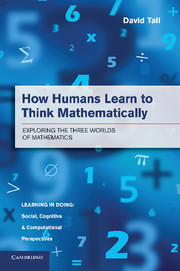Book contents
- Frontmatter
- Dedication
- Contents
- Series Foreword
- Journeys through three worlds of mathematics
- Preface
- Acknowledgements
- Illustration Credits
- I Prelude
- 1 About this Book
- II School Mathematics and Its Consequences
- III Interlude
- IV University Mathematics and Beyond
- Appendix Where It All Came From
- References
- Index
1 - About this Book
from I - Prelude
Published online by Cambridge University Press: 05 June 2014
- Frontmatter
- Dedication
- Contents
- Series Foreword
- Journeys through three worlds of mathematics
- Preface
- Acknowledgements
- Illustration Credits
- I Prelude
- 1 About this Book
- II School Mathematics and Its Consequences
- III Interlude
- IV University Mathematics and Beyond
- Appendix Where It All Came From
- References
- Index
Summary
Mathematics is a subject with patterns that generate enormous pleasure for some and problems that cause impossible difficulties for others. The situation is made more complicated by different views of what mathematics is and how it should be taught. This book takes a journey from the early conceptions of a newborn child to the frontiers of mathematical research. Its purpose is to present a framework that enables everyone with an interest in mathematical thinking, at any level, to communicate with others in a manner appropriate for their needs. At its foundation is the most fundamental question of all:
How is it that humans can learn to think mathematically in a way that is far more subtle than the possibilities available for other species?
By focusing on foundational issues and relating them to the long-term development of the subject, it becomes possible to express general ideas at all levels within a single framework, from the ways in which we make sense of the world around us through our perceptions and actions, to the development of more sophisticated ideas using language and symbolism.
Contrary to common belief, new levels of mathematical thinking are not necessarily built consistently on previous experience. Some experiences at one level may be supportive at the next but others may be problematic. For instance, number facts from whole number arithmetic continue to be supportive in fractions and decimals but the experience of multiplying whole numbers sets an expectation that the product is always larger. This becomes problematic when multiplying fractions. Everyday experience tells us that ‘taking something away leaves something smaller.’
- Type
- Chapter
- Information
- How Humans Learn to Think MathematicallyExploring the Three Worlds of Mathematics, pp. 3 - 30Publisher: Cambridge University PressPrint publication year: 2013

